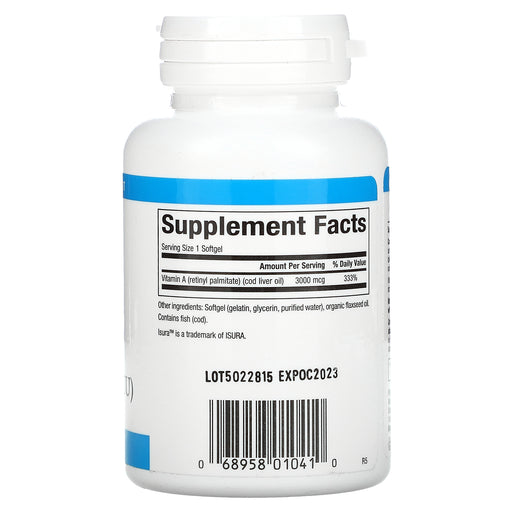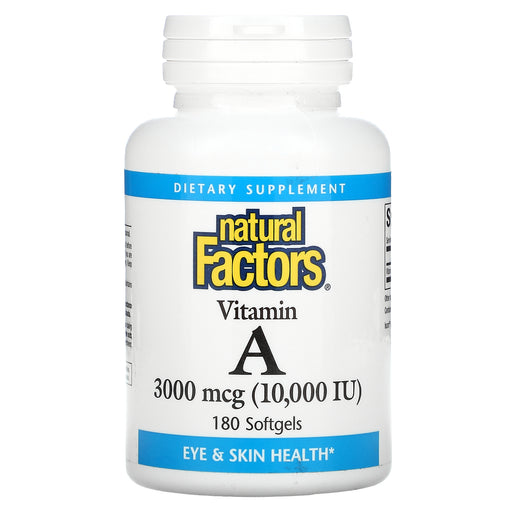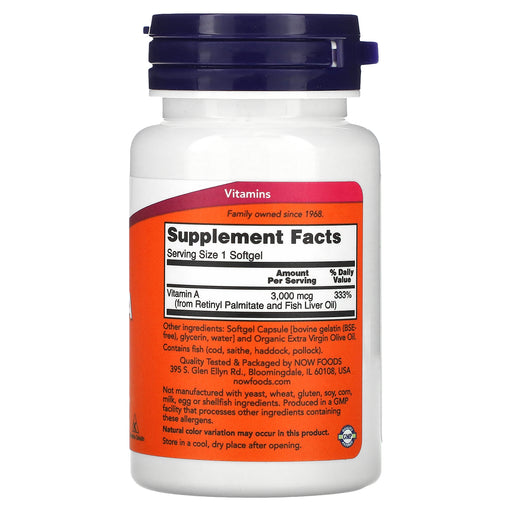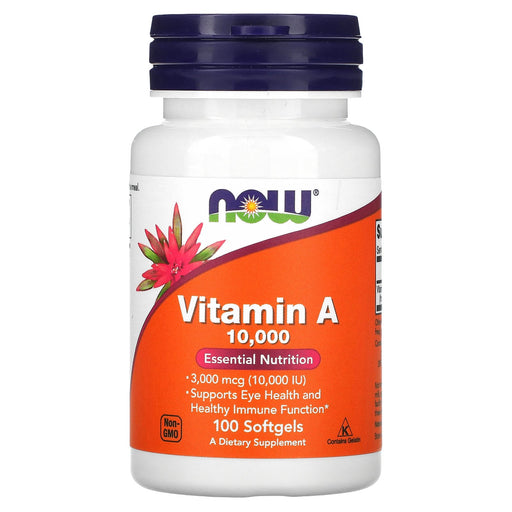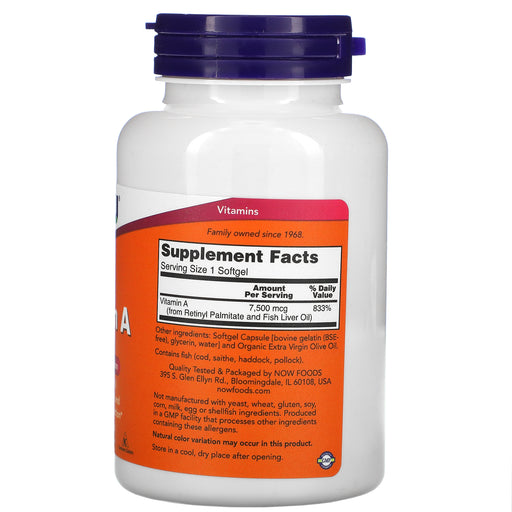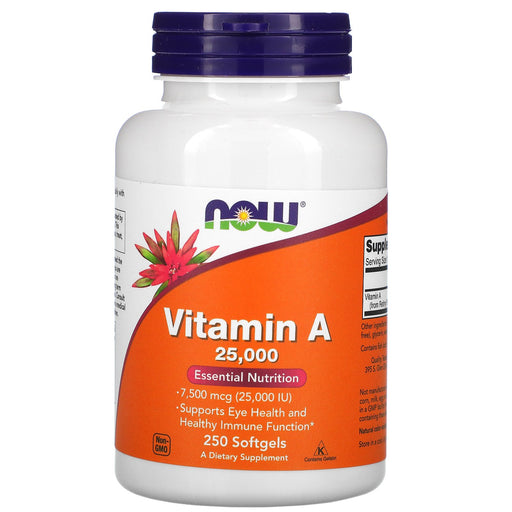
Supporting Vision, Immune Health, and Cell Growth
Vitamin A is an essential fat-soluble vitamin that plays a vital role in maintaining overall health and well-being. With its diverse functions in the body, including support for vision, immune health, and cell growth and differentiation, Vitamin A is a crucial nutrient that should not be overlooked.
Understanding Vitamin A
Vitamin A is a group of compounds that includes retinol, retinal, and retinoic acid, as well as provitamin A carotenoids like beta-carotene, which the body can convert into active Vitamin A. This essential vitamin is found in two main forms:
- Preformed Vitamin A (Retinol): Found in animal-derived foods such as liver, eggs, and dairy products.
- Provitamin A Carotenoids: Found in plant-based foods like sweet potatoes, carrots, spinach, and kale, which the body converts into active Vitamin A.
Vitamin A plays a critical role in several bodily functions, including:
- Vision Support: Vitamin A is essential for the production of rhodopsin, a pigment in the eyes that enables low-light and color vision.
- Immune Function: Vitamin A supports the development and function of immune cells, helping to maintain a strong immune system and protect against infections.
- Cell Growth and Differentiation: Vitamin A is involved in the regulation of cell growth and differentiation, making it crucial for the development and maintenance of healthy skin, hair, and mucous membranes.
The Benefits of Vitamin A Supplementation
While a balanced diet that includes Vitamin A-rich foods is the best way to ensure adequate intake, some individuals may benefit from Vitamin A supplementation. These include:
- Individuals with Malabsorption Conditions: Certain health conditions, such as celiac disease or cystic fibrosis, can impair the absorption of fat-soluble vitamins like Vitamin A.
- Vegans and Vegetarians: As preformed Vitamin A is primarily found in animal-derived foods, those following a plant-based diet may need to supplement with provitamin A carotenoids to ensure adequate intake.
- Pregnant and Lactating Women: Vitamin A is essential for fetal development and maternal health, making supplementation important for women during pregnancy and lactation.
Vitamin A and Related Nutrients
To maximize the benefits of Vitamin A, consider pairing it with related nutrients that work synergistically to support overall health and well-being, such as:
- Zinc: This essential mineral plays a crucial role in the absorption and metabolism of Vitamin A. Combining Vitamin A with Zinc supplements may enhance its bioavailability and effectiveness.
- Vitamin D: Vitamin D works together with Vitamin A to support immune function, bone health, and cell differentiation. Pairing Vitamin A with Vitamin D supplements may provide a synergistic effect for optimal health.
- Vitamin E: As another fat-soluble vitamin, Vitamin E acts as an antioxidant and supports the absorption and utilization of Vitamin A. Combining Vitamin A with Vitamin E supplements may further enhance its health benefits.
Choosing High-Quality Vitamin A Supplements
When selecting a Vitamin A supplement, it's essential to choose a high-quality product from a reputable brand. Consider the following factors:
- Form of Vitamin A: Look for supplements that provide Vitamin A in the form of retinol or beta-carotene, depending on your specific needs and preferences.
- Optimal Dosage: Choose supplements that provide an appropriate dosage of Vitamin A based on your age, sex, and health status. Be cautious not to exceed the recommended daily intake, as excessive Vitamin A can lead to toxicity.
- Purity and Quality: Opt for supplements manufactured in GMP-certified facilities, free from contaminants and fillers, and third-party tested for purity and potency.
- Brand Reputation: Select supplements from trusted brands with a history of producing effective, science-backed nutritional products.
Incorporating Vitamin A Supplements into Your Health Regimen
To maximize the benefits of Vitamin A supplementation, consider the following tips:
- Consult with a Healthcare Professional: Before starting any new supplement regimen, consult with a healthcare professional to determine if Vitamin A supplementation is appropriate for your individual needs and health status.
- Pair with a Balanced Diet: While Vitamin A supplements can help ensure adequate intake, they should be used in conjunction with a balanced diet that includes a variety of Vitamin A-rich foods.
- Be Mindful of Interactions: Vitamin A supplements can interact with certain medications, such as blood thinners and retinoid medications. Always inform your healthcare provider about any supplements you are taking to avoid potential interactions.
Support Your Health and Well-Being with Vitamin A
Ready to experience the essential benefits of Vitamin A for your vision, immune health, and cell growth? Experience our collection of premium Vitamin A supplements and take the first step towards optimal health and well-being.
Our Vitamin A products are carefully formulated with high-quality, bioavailable ingredients to ensure maximum absorption and effectiveness. Whether you're looking to support your vision, boost your immune system, or maintain healthy skin and mucous membranes, our supplements can help you achieve your health goals.
Invest in your health and well-being with Vitamin A. Browse our collection today and unleash the potential of this essential nutrient for your overall vitality and wellness.
Frequently Asked Questions about Vitamin A
1. What are vitamin A supplements good for?
Vitamin A supplements can help:
- Maintain healthy vision, particularly in low light conditions
- Support immune system function
- Promote healthy skin, hair, and mucous membranes
- Aid in the production and function of white blood cells
- Support bone health and reproduction
Vitamin A is essential for various bodily functions, and supplements can help prevent or treat deficiencies, which may lead to night blindness, impaired immune function, and skin issues.
2. Is it okay to take vitamin A everyday?
While it is generally safe to take vitamin A supplements daily, it is essential to follow the recommended dosage and consult with a healthcare professional. Vitamin A is a fat-soluble vitamin, which means it can accumulate in the body if taken in excess. Chronic high doses of vitamin A can lead to toxicity, causing symptoms such as:
- Nausea and vomiting
- Headache
- Blurred vision
- Liver damage
Pregnant women should be particularly cautious, as excessive vitamin A intake can increase the risk of congenital disabilities.
3. What is the best vitamin for vitamin A?
The best vitamin A supplement may depend on individual needs and preferences. Some common forms of vitamin A supplements include:
- Retinol: The preformed, active form of vitamin A found in animal sources
- Beta-carotene: A plant-based precursor to vitamin A that the body can convert as needed
- Multivitamins: Many multivitamin formulas contain vitamin A, often in the form of beta-carotene or a combination of retinol and beta-carotene
When choosing a supplement, look for high-quality, third-party tested products from reputable brands to ensure purity and potency.
4. Which foods have vitamin A?
Vitamin A can be found in various foods, including:
- Animal sources (preformed vitamin A, or retinol):
- Liver and liver products (e.g., cod liver oil)
- Egg yolks
- Dairy products (milk, cheese, butter)
- Fish oils
- Plant sources (provitamin A carotenoids, like beta-carotene):
- Orange and yellow fruits and vegetables (carrots, sweet potatoes, mangoes, apricots)
- Leafy green vegetables (spinach, kale, collard greens)
- Tomatoes and red bell peppers
Consuming a balanced diet with a variety of these foods can help ensure an adequate intake of vitamin A.
5. Can vitamin A improve eyesight?
Vitamin A is essential for maintaining healthy eyesight, particularly in low light conditions. It plays a crucial role in the production of rhodopsin, a pigment in the retina that helps the eye adapt to dim light. Vitamin A deficiency can lead to night blindness, a condition where the eyes struggle to adjust to low light. However, while vitamin A is necessary for proper eye function, taking supplements will not improve vision beyond normal levels if there is no underlying deficiency. Regular eye exams and a balanced diet are essential for maintaining overall eye health.
6. Who needs vitamin A the most?
While everyone needs vitamin A for proper bodily functions, certain groups may be at a higher risk of deficiency and may benefit more from supplements:
- Pregnant and breastfeeding women: Require higher levels of vitamin A for fetal development and to support the increased nutritional demands of pregnancy and lactation
- Infants and children: Need vitamin A for proper growth, immune function, and eye development
- People with malabsorption disorders: Conditions like celiac disease, cystic fibrosis, and inflammatory bowel disease can impair vitamin A absorption
- Individuals with low dietary intake: Those following restrictive diets or with limited access to vitamin A-rich foods may be at risk of deficiency
7. Are vitamin A supplements safe?
Vitamin A supplements are generally safe when taken as directed and under the guidance of a healthcare professional. However, excessive intake of vitamin A can lead to toxicity, causing adverse effects such as:
- Nausea and vomiting
- Headache and dizziness
- Blurred vision and other eye problems
- Liver damage
- Congenital disabilities in pregnant women
To minimize the risk of toxicity, it is essential to follow the recommended daily allowance (RDA) for vitamin A and consult with a healthcare provider before starting any supplement regimen.


